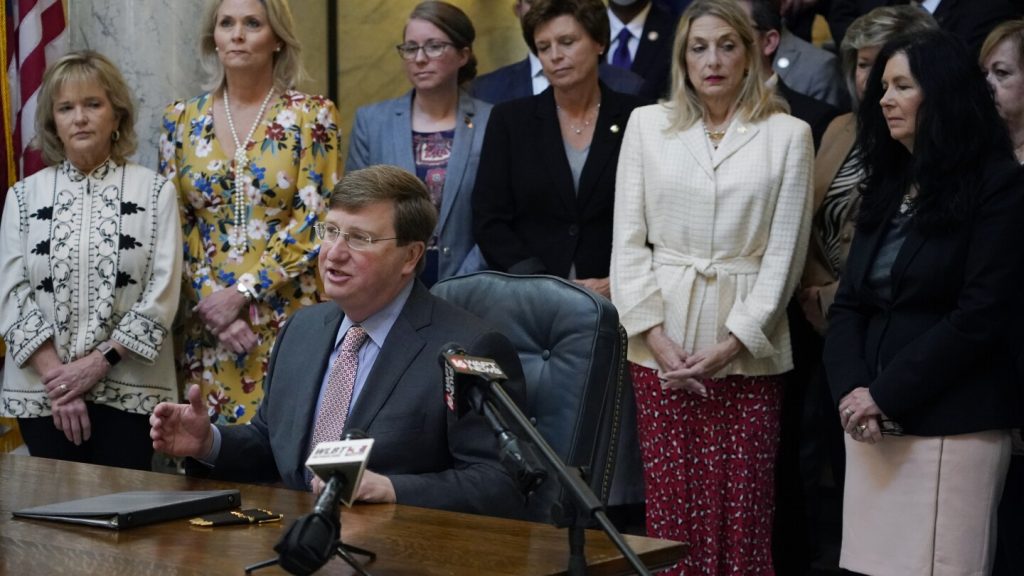Mississippi Governor Tate Reeves signed a new law on Monday regulating transgender people’s use of bathrooms, locker rooms, and dormitories in public education buildings, making Mississippi the 12th state to restrict transgender students from using facilities that align with their gender identity. The law requires all public education institutions in the state to equip their buildings with single-sex bathrooms, changing areas, and dormitories, as well as at least one gender-neutral bathroom and changing room. People would only be allowed to enter spaces that correspond to their sex assigned at birth, regardless of their appearance or any procedures they’ve had to affirm their gender identity. Those who violate the policy could be sued, but schools, colleges, and universities would be protected from liability.
The new law took immediate effect and declares that people are either male or female “as observed or clinically verified at birth, without regard to a person’s psychological, chosen, or subjective experience, feelings, actions, or sense of self.” Critics, particularly Democrats, have raised concerns that the new restrictions on bathrooms and other facilities would put transgender people at risk. They also criticized Republicans for focusing on this issue while other legislative priorities remained unfinished. Governor Reeves has previously signed legislation banning transgender athletes from competing on girls’ or women’s sports teams in 2021 and a bill to ban gender-affirming hormones or surgery for anyone younger than 18 last year.
Republican attorneys general from Mississippi and other states are challenging a federal regulation that bans blanket policies barring transgender students from school bathrooms aligning with their gender identity, among other provisions. Governor Reeves expressed his disbelief that passing laws to protect women’s spaces has become necessary, stating that it was unimaginable a few years ago. The Mississippi proposals are part of a larger trend in state legislatures where Republicans are seeking to restrict transgender people’s access to gender-affirming care, bathrooms, sports, and other related issues. The legislation in Mississippi reflects a growing debate around transgender rights and protections across the country, with both supporters and opponents of such restrictions voicing their views on the matter.
The new law in Mississippi indicates a shift towards stricter regulations on transgender people’s access to facilities based on their gender identity, with an emphasis on sex assigned at birth rather than self-identification or psychological experiences. Supporters argue that such laws are necessary to protect women’s spaces and ensure privacy and security in public education buildings. Critics, on the other hand, contend that these restrictions pose risks to transgender individuals and may infringe on their rights and well-being. The legal challenges and debates surrounding transgender rights and protections highlight the ongoing tensions and complexities in navigating issues related to gender identity and expression, particularly in public spaces and educational settings.
The Mississippi law adds to a broader conversation about transgender rights and discrimination in the United States, with various states enacting legislation that either supports or restricts transgender individuals’ access to bathrooms, sports, healthcare, and other services. As the debate continues at both the state and federal levels, activists and advocates on both sides of the issue are working to advance their respective agendas and push for policies that reflect their beliefs and values. The impact of such laws on transgender communities, particularly youth and students, remains a key concern, as they navigate challenges and obstacles to accessing essential services and accommodations that affirm their gender identities and experiences.
Overall, the passage of the new law in Mississippi regarding transgender people’s use of public education facilities underscores the ongoing tensions and debates surrounding gender identity, privacy, and safety. In signing the legislation, Governor Tate Reeves has taken a firm stance in favor of restricting transgender individuals’ access to facilities that align with their gender identity, citing concerns about protecting women’s spaces and ensuring clarity and consistency in determining sex categories for use of such spaces. However, critics argue that these restrictions could harm transgender people and limit their ability to fully participate in public life and access necessary resources and support. The broader implications of these laws extend beyond Mississippi, reflecting a nationwide conversation about transgender rights and protections in various settings, including education, healthcare, and sports.


